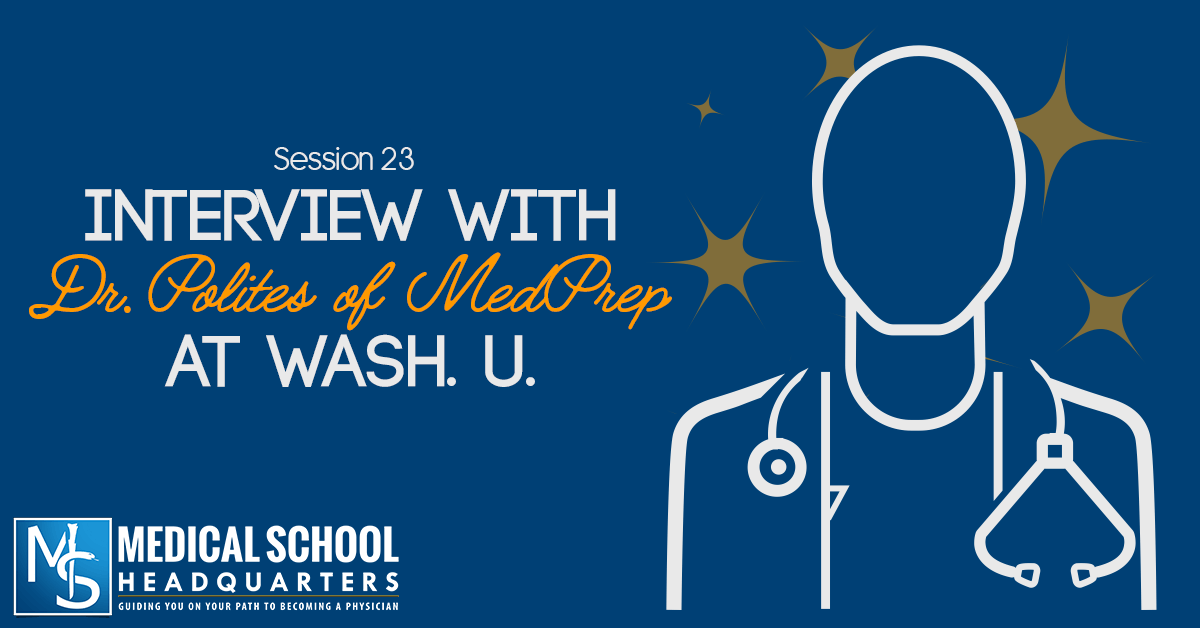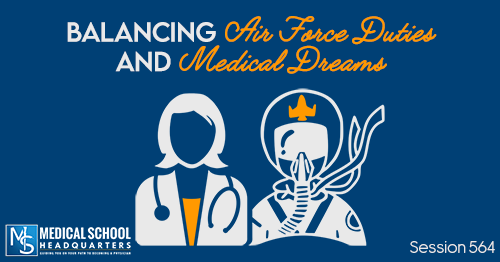Apple Podcasts | Google Podcasts
Session 23

In today’s episode, I talk with Dr. Greg Polites, a physician, an educator, and a mentor at Washington University in St. Louis where he teaches the MedPrep program.
Greg is an Associate Professor of Emergency Medicine at Wash. U. He serves as Chairman of the Central Subcommittee for Admissions to the School of Medicine and is the former coursemaster for the Practice of Medicine for the 1st and 3rd-year medical students there.
Today, we discuss topics such as starting undergrad on the right foot, overextending yourself, volunteering, and some pieces of advice related to extracurricular activities. Greg also talks about the MedPrep program that prepares undergrad students for medical school and beyond.
Listen to this podcast episode with the player above, or keep reading for the highlights and takeaway points.
About MedPrep at Wash. U.
- Seeing the void that needed to be met to give an idea of what medicine is all about
- A course that lays out the entire education process from the first day of college to the day of becoming a physician
- Foundational lectures covering topics like the different stressors in medicine, patient care management, medical ethics & dilemmas, and other medical issues
- An overview of the timeline relating to the medical school curriculum, matching process, residency training, and becoming a board-certified physician
- Q&A sessions with resident physicians in multiple specialties and Wash. U medical students
Greg’s Advice to Premed Students That Don’t Have MedPrep:
Having a plan
- Have a plan as early as possible.
- Sit down and have a general idea of how you’re going to use the next few years and your summers as a premed.
Extracurricular activities
- Don’t get overextended early on.
- Start slow and build a foundation for success.
- Come to college and be a bookworm.
- Don’t get too involved in more than one serious extracurricular activity at the same time.
- Start the process with momentum and ease into college.
[Related episode: 5 Common Mistakes Premeds Make with Extracurriculars.]
Resources
- Make use of the university-provided tutors.
- Get to know your professors.
- Interact with your advisors early on since they will most likely be writing your letters of recommendation during the application process.
[Related post: Premed Advisors: Don’t Believe Everything You Hear.]
Course correction
- Overextending and having bad grades: What do you do?
- Try to improve with each successive semester
- Move forward and do well in higher-level courses in the same discipline
- Don’t take a class over again if you got a C in it unless you don’t have foundational knowledge to move onto the next course
AACOMAS grade replacement
AMCAS (for allopathic/MD granting schools) application has no grade replacement. If you retake a class, your two grades will be averaged together for GPA purposes.
AACOMAS (for osteopathic/DO schools) applications have used to have grade replacement, which allowed more leniency. Note: Since this podcast was recorded, AACOMAS has ended grade replacement. Now AACOMAS calculates GPA in the same way as the AMCAS application: Both attempts of the class are averaged together for your GPA.
Other things to consider:
- Having an understanding of each component of the application
- Making your academics a priority above all else
- Exploring and asking yourself why you want to be a doctor through shadowing
- Doing volunteering, shadowing, or research not for checking off the boxes for your application but to figure out if medicine is something that you really like
- Research as not a mandatory thing for your application
- Doing something you’re passionate about and that you enjoy
Choosing what undergrad school to go to:
- Don’t look at it in terms of the name of the school but in terms of the preparation
[Related post: Choose the Best Premed School for Undergrad.]
Misconceptions premed students have about medicine:
- Medicine as all-consuming
- Watch Doctors Diaries to get a sense of this
- Finding a specialty that works with your lifestyle
- Having a realistic expectation of the average lifestyle for a certain specialty
[Related episode: How to Think About Choosing a Residency & Specialty.]
The importance of applying early:
- Not applying early—one of the most common mistakes students make on their application
- Most schools accept applicants on a rolling basis
- Holding off on your application delays the whole process and it becomes more competitive
- Make sure to work on your personal statement
Listen to more episodes I’ve recorded with Dr. Greg Polites:
- How to Fix a Medical School Application After Starting Premed Poorly.
- Writing Personal Statements for Medical School.
- Preparing for the Medical School Interview.
Links and Other Resources
- Check out my Premed Playbook series of books (available on Amazon), with installments on the personal statement, the medical school interview, and the MCAT.
- Related episode: Common MCAT Prep Mistakes and How to Avoid Them.
- Related episode: The Extreme Burden of Being a Physician (It’s Worth It).
- Need MCAT Prep? Save on tutoring, classes, and full-length practice tests by using promo code “MSHQ” for 10% off Next Step full-length practice tests or “MSHQTOC” for $50 off MCAT tutoring or the Next Step MCAT Course at Blueprint MCAT (formerly Next Step Test Prep)!











